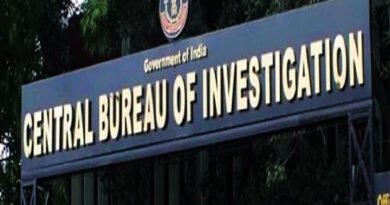JK Bank Chief sacked for indulgence into corruption, nepotism, favouritism, backdoor appointments
New Delhi: Parvez Ahmad Nengroo, who was sacked from the post of J&K Bank chairman on Saturday, is alleged to have sanctioned loans worth hundreds of crores of rupees, in brazen violation of laid down guidelines and standard operating procedures, to clients recommended by former ministers in PDP-BJP government.
J&K Anti-corruption Bureau (ACB is now probing how Shamsuddin Andrabi, the class 12-pass brother of ex-PDP minister Farooq Andrabi and ex-chief minister Mehbooba Mufti’s uncle, was appointed directly as Manager in J&K Bank. Andrabi is currently posted in the Bank’s Bhaderwah branch.
Among the several allegations of nepotism, corruption and financial irregularities against Nengroo now under the lens are the appointment of several members of his extended family, including some in key positions, in the bank.
ACB is probing how two J&K Bank branches – Karin, Shopian and Wuyan, Pulwama – are operating from his personal premises and that of his in-laws. Both locations are highly unsuitable from banking point of view, sources in the investigative agencies told.
ACB sleuths are investigating how Nengroo, whose registered date of birth as per his service and school records is 21-04-1963, passed matriculation exam at the age of 14 years in November 1977.
The government on Sunday claimed that action against former Jammu & Kashmir Bank Chairman Parvez Ahmed Nengroo is in line with its policy of zero tolerance against corruption and terrorism in Jammu Kashmir.
Claiming that Parvez Ahmed Nengroo was allegedly involved in corruption, nepotism and favouritism, the officials said, the action against him was an effort to combat such activities and bring mighty people with “dubious credentials” before law.
It is also learnt from the officials that the action was taken by the Anti-Corruption Bureau (ACB), which was established a few months ago in Jammu and Kashmir under the charge of Mr. Aditya Raj Koul, currently under the President’s rule, following persistence of the MHA to improve governance, clamp down on terror-funding and money laundering.
Jammu and Kashmir Governor Satya Pal Malik had yesterday removed Parvez Ahmed from the post of chairman-cum-managing director of the bank in a ‘love-me, love-me-not’ situation.
The ACB also raided the bank’s headquarters. The state government holds 59 per cent of shares in the J&K Bank.
Interestingly, the Jammu Kashmir Bank under the Chairmanship of Mr. Parvez Ahmad Nengroo, defied arrogantly the JK Government’s order bringing the Bank under the Provision of J&K RTI Act to keep insulated his arbitrary and non-transparent functioning.
It has been alleged that Ahmed got his nephew, Muzaffar, posted into his office immediately after taking over as chairman.
He got his nephew Muzaffar, considered his key point-man, posted in his office immediately after taking over as chairman.
His daughter-in-law, Shazia Ambreen, was also allegedly appointed as a probationary officer and is currently heading the Hazratbal branch, the official said, while noting that these aspects are under the scrutiny of the ACB.
J&K Bank Personnel Manager, Aslam Ganai, believed to be close to Chairman, allegedly acted as a conduit for effecting transfers in the bank, as per ex-chairman’s wishes and with complete disregard to bank’s interests, a source pointed out.
Two of Nengroo’s relatives – Asif Beg and M Fahim – control HR and Board affairs including credit proposals, while two other relatives – Faheem Nengroo and Taseen Nengroo – were posted in the ex-chairman’s office.
Two branches of J&K Bank, Kaprin in Shopian and Wuyan in Pulwama, operate allegedly from his own premises and those of his in-laws, they said, adding two of Ahmed’s relatives, Asif Beg and M Fahim, both nephews, allegedly controlled the HR and board affairs including the credit proposals.
Recently the J&K Bank signed an insurance deal with IFFCO Tokio General Insurance Company, where the chairman’s sister’s son reportedly works, according to the official.
It also alleged that interiors of hundreds of the branches were allegedly allotted to select individuals for Rs 50 lakh to Rs 1.5 crore per branch, while the actual cost is only 30 percent of the money paid.
Loans worth hundreds of crores were allegedly allotted without formalities in “brazen violation” of Standard Operating Procedures (SOPs) or guidelines to select references from local politicians and especially by two ministers in PDP-BJP Government.
Overdrafts of hefty amounts were allegedly released to habitual defaulters of other banks. Many of such accounts turned NPA. Also, one-time settlements were done with select defaulters, purportedly against huge kickbacks.
Investigation sources claimed Rs 8 crore was spent under CSR on beautification of Royal Spring Golf Course, which is a rendezvous of elite and has no utility for common people.
Later one-time settlements were done with select defaulters against alleged huge kickbacks.
It was also alleged that Rs 30 lakh was paid to a local magazine having little visibility for publishing advertisements to highlight the Budget, the officials said. Besides, the Jammu Kashmir Bank has indirectly won the select print and electronic media by giving generous advertisements at the cost of the Bank’s exchequer.
After his removal, Ahmed in a Twitter post said he has absolutely no regret over his work and that he did his job “most diligently, honestly and in the best interest of the institution”.
He went on to add: “Open to scrutiny on each and every transaction I have done during my two decades of functioning in the bank.”
Ahmed was appointed as chairman of the J&K Bank in October 2016 and his tenure was to end in a few months. But the government officials said, Ahmed had a meteoric rise “from a CA to Chairman of the Bank” within a span of 15 years and has “dubious credentials and shady reputation”.
In its efforts to crackdown on corruption, nepotism, favouritism, and striking against the backdoor non-transparent employment, the MHA had called for cleaning of the J&K Bank and bringing transparency and accountability, while ensuring compliance with RBI directives to bring checks and balances. The bank has also been directed to separate the positions of chairman and managing director for better governance and ensure high levels of financial probity, the officials informed. (Northlines)




